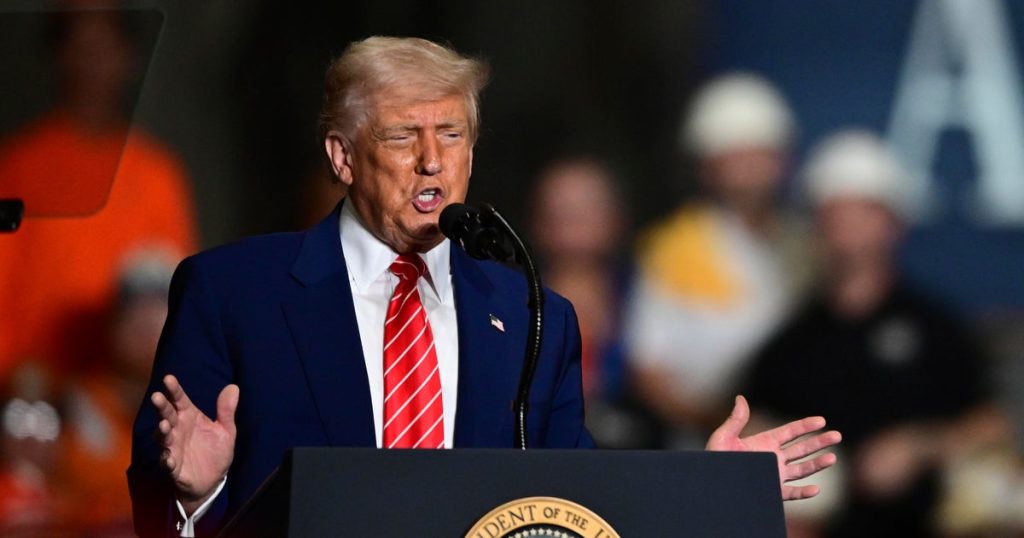A federal judge in California has blocked the Trump administration from deporting Venezuelan migrants using the Alien Enemies Act, deeming the government’s due process violations unacceptable. U.S. District Judge John Holcomb issued this ruling in response to concerns regarding the administration’s approach to deportations related to alleged gang affiliations. This decision represents the latest move in an evolving legal battle over the administration’s controversial immigration tactics and their implications on migrant rights.
| Article Subheadings |
|---|
| 1) Overview of the Ruling |
| 2) Context of the Alien Enemies Act |
| 3) The Case of Darwin Antonio Arevalo Millan |
| 4) Broader Implications on Immigration Policy |
| 5) Future of the Legal Battle |
Overview of the Ruling
On Monday, U.S. District Judge John Holcomb issued a preliminary injunction against the deportation of Venezuelan migrants under the Trump administration’s invocation of the Alien Enemies Act. The judge criticized the government for failing to provide adequate notice and due process for migrants who are at risk of being rapidly deported. Holcomb’s ruling specifically applies to the Central District of California, which encompasses major metropolitan areas including Los Angeles and Orange County. This decision marks a significant pushback against the administration’s controversial use of the 1798 law to facilitate the removal of individuals accused of gang affiliations, particularly those tied to the Tren de Aragua gang, without fair legal recourse.
Context of the Alien Enemies Act
The Alien Enemies Act, a law dating back to 1798, allows the U.S. government to deport non-citizens during times of war or perceived invasions. The Trump administration has employed this legislation as a legal basis for its early 2023 crackdown on Venezuelan migrants considered gang members, primarily targeting those implicated in the activities of Tren de Aragua. Critics argue that the law is being misapplied, as these individuals are not engaging in acts of war but are instead victims of violence and political instability in their country. Various courts across the country, including those in New York, Colorado, and Texas, have previously ruled against similar uses of this act, asserting that it does not justify the administration’s actions.
The Case of Darwin Antonio Arevalo Millan
Central to Judge Holcomb’s decision is the case of Darwin Antonio Arevalo Millan, a Venezuelan man with a petition for release based on his claim for asylum. Arevalo was detained after a scheduled check-in with Immigration and Customs Enforcement (ICE) and was informed that his detention was partially due to his tattoos, which the government associated with gang affiliation. While the administration argued that his detention did not stem from the Alien Enemies Act, Holcomb noted that Arevalo still “faces an imminent threat of removal.” The ruling highlights concerns surrounding the government’s approach to due process, particularly regarding how much notice detainees receive to challenge their deportations.
Broader Implications on Immigration Policy
Judge Holcomb’s ruling adds another layer to the ongoing debate surrounding immigration policy in the United States. Critics of the Trump administration’s methods argue that the use of the Alien Enemies Act is a dangerous precedent that allows for the swift removal of individuals without adequate oversight or legal recourse. This case underscores the tension between federal immigration enforcement and the legal rights of individuals facing deportation. With hundreds of Venezuelan migrants reportedly having been sent to prisons in El Salvador without due process, the broader implications of Holcomb’s decision could resonate throughout the legal landscape governing immigration, potentially impacting future policies and judicial interpretations.
Future of the Legal Battle
As the legal battle continues, the Supreme Court has yet to make a definitive ruling on the legality of the Alien Enemies Act’s application in this context. Recent comments from Justice Brett Kavanaugh suggest that the Court is aware of the urgency surrounding this issue and may need to intervene to provide clarity on the matter. The complexity of ongoing cases and conflicting decisions in various states indicate that the judicial interpretation of the Alien Enemies Act could evolve based on how different regions address these challenges. As legal experts and advocates closely monitor developments, the future of U.S. immigration policy remains uncertain, particularly for vulnerable populations such as Venezuelan migrants.
| No. | Key Points |
|---|---|
| 1 | A federal judge has blocked deportations of Venezuelan migrants under the Alien Enemies Act. |
| 2 | The decision highlights issues of due process related to rapid deportation practices. |
| 3 | The ruling specifically affects the Central District of California, which includes Los Angeles. |
| 4 | The case of Darwin Antonio Arevalo Millan is central to the judge’s decision regarding due process. |
| 5 | The legal landscape surrounding the Alien Enemies Act is evolving, with implications for future immigration policy. |
Summary
In conclusion, the recent ruling by Judge John Holcomb against the deportation of Venezuelan migrants serves as a critical examination of the Trump administration’s use of the Alien Enemies Act. As legal interpretations and challenges continue to unfold, the implications for immigrant rights, due process, and overall U.S. immigration policy remain significant. Stakeholders in this evolving legal landscape must consider the ramifications of such legal positioning as debates around immigration intensify.
Frequently Asked Questions
Question: What is the Alien Enemies Act?
The Alien Enemies Act is a U.S. law from 1798 that permits the government to deport non-citizens during times of war or perceived invasions based on the notion of national security.
Question: Who is Darwin Antonio Arevalo Millan?
Darwin Antonio Arevalo Millan is a Venezuelan man whose case is central to the recent injunction against deportations; he argued for asylum but was detained due to alleged gang affiliations.
Question: What are the broader implications of this ruling?
This ruling could affect future immigration policies and foster ongoing legal challenges regarding the rights of migrants, particularly with respect to due process in deportation cases.


